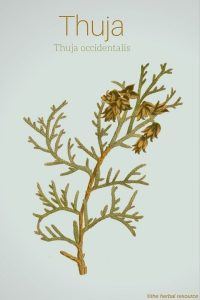Thuja contains an essential oil (0.4 to 1%) which mainly consists (up to 65% ) of the poisonous chemical thujone. Other ingredients found in the plant are sesquiterpenes, flavonoids, mucilage substances, tannin, and polysaccharides.
The tree was used traditionally for centuries by the native Americans to treat a variety of ailments and later adopted by the European settlers.
A decoction made from the young twigs and leaves was used to treat a cough, fever, headache, intestinal parasites, cystitis and venereal diseases.
Externally, thuja was used as a poultice to treat burns, rheumatism, gout, arthritis, warts, and psoriasis.
The Native Americans would burn the tree to produce thick smoke as it was their belief that the smoke could keep evil spirits at bay.
Today, thuja is mostly used against warts and polyps, but to some extent, it is also used as a remedy for acute bronchitis and other respiratory disorders due to the herb’s expectorant and anti-catarrhal properties.
Thuja is a diuretic and has been used to treat cystitis and bed-wetting in children.
Extracts of the herb can be applied to painful joints and muscles to increases blood circulation and thus reduce pain and stiffness.
To get rid of warts the herb was used as a topical treatment and applied either as a tincture or essential oil. Usually, a topical treatment involving a tincture should be continued for a few weeks for the best results.
The essential oil is only used to burn away warts. When the oil is used in this regard, glycerol is applied to the area surrounding the wart as a protection and then the poisonous essential oil is used on the wart itself.
Some research studies have shown that thuja has antiviral properties although it is not yet clear which substances are responsible for this effect.
Despite the fact that the herb has been used for hundreds of years in folk medicine there has been little scientific research on the therapeutic benefits of the plant, at least if compared with some other more known viral inhibitory herbs like echinacea (Echinacea spp).
Thuja has also antibacterial and antifungal properties and can, therefore, be used for the treatment of infected wounds, burns and skin infections such as ringworm.
Recently, German scientists demonstrated that Thuja strengthens the immune system by stimulating T lymphocytes and increase interleukin-2 production.
The virus-resistant and immune strengthening properties of the herb can also help provide greater tolerance to chemotherapy and radiotherapy.

Leave a Reply